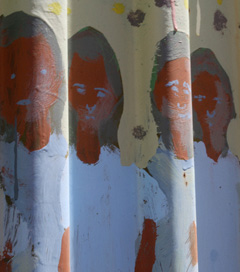Despite a year of record deportations and little movement on a progressive immigration policy, undocumented people are coming out and publicly declaring their immigration status for the third year in a row, telling American society that they are “undocumented, unafraid and unapologetic.”
March 10 will be the first day of a weeklong set of actions by a coalition of groups in Illinois to highlight the continuing crisis caused by enforcement and lack of rights in immigrant communities and to find a way to include the voices of immigrants themselves in the debate about these issues.
“When we come out and share our stories, we challenge people to no longer think of us as 'illegal,' but they think of you as Arianna, Jorge, as Fanny as Miguel; human beings that have reasons for coming and staying in this country,” said Arianna Salgado, an organizer with the immigrant rights group Nuestra Voz. “It's important for us to come out, share who we are and let people know why we are here. And why we are staying here.”
The Coming Out of the Shadows week of action started in Chicago in 2010 at the height of the DREAM (Development, Education and Relief for Minors) Act movement, with undocumented youth using “coming out” strategies and civil disobedience to push for the bill that would have given immigrants minors without papers a path to citizenship.
The activists connected this to the fight against restrictive bills like Arizona's SB1070 and the rash of anti-immigrant legislation that came out of other Southern states, including Georgia and Alabama. The group of undocumented youths that planned the first Coming Out of the Shadows, the Immigrant Youth Justice League, later did civil disobedience actions in Arizona, Georgia and Alabama against unjust immigration laws.
But since the promise of 2010, the immigration landscape has changed dramatically. The year 2011 saw a record number of deportations, with more than 400,000 immigrants sent out of the country and the DREAM Act has yet to become law, after falling short of five votes it needed to pass in December 2010.
Meanwhile, a growing backlash against the Secure Communities Program and its claim to focus on deporting immigrants who have committed serious crimes, despite evidence that many immigrants with no criminal records are caught in its dragnet, comes at the same time as an announcement that the program will become mandatory by 2012.
The Coming Out of the Shadows week of action will end in DuPage County, infamous in Illinois for its tough enforcement of Secure Communities. Out of all five counties in Illinois, DuPage transfers the highest number of people to immigration custody.
“Because of Secure Communities, my family and I have to worry everyday about whether we will be picked up and deported,” said Fanny Lopez-Martinez, an undocumented student from DuPage County. “My husband has to worry about his wife not being home when he gets back. Since I started attending college my fears increased because I drive to and from school five days a week.”
Groups in Illinois are also fighting plans to build the state's first private immigration prison just 30 minutes south of Chicago in Crete, Illinois. The proposed detention center would also be the biggest in the state, holding 700 beds.
This is a sign that immigration policy will only become more punitive, say organizers working against the proposed detention center.
The center will “feed a new wave of anti-immigrant frenzy,” said Rozalinda Borcila, an immigrant rights activist, who is part of a coalition of residents, immigrant rights activists and clergy that have been organizing against the proposed center. “Once you have more detention capacity, you have incentives to produce more immigrant 'criminals' to lock up.”
Despite these setbacks, both locally and nationally, immigrants participating in Coming Out of the Shadows and other groups believe that a fight for immigrant rights is also a fight for civil rights.
A march this week in Alabama against an immigration law that would require, among other things, police to question anyone suspected of being undocumented, has been called the second Selma to Montgomery March, commemorating the 47th anniversary of the civil rights march.
The National Association for the Advancement of Colored People holds a five-day march to commemorate the Selma to Montgomery march every year, and this year, the fourth day of the march will be focused on immigrant rights issues.
“This historic act of coalition building presents a unique opportunity for organizers in Chicago to remember our common history of struggle,” said a press release by the Illinois Coalition for Immigrant and Refugee Rights, which is driving to Alabama for the march, “and build lasting relationships between the Civil Rights and Immigrant Rights communities.”
Join us in defending the truth before it’s too late
The future of independent journalism is uncertain, and the consequences of losing it are too grave to ignore. To ensure Truthout remains safe, strong, and free, we need to raise $46,000 in the next 7 days. Every dollar raised goes directly toward the costs of producing news you can trust.
Please give what you can — because by supporting us with a tax-deductible donation, you’re not just preserving a source of news, you’re helping to safeguard what’s left of our democracy.
